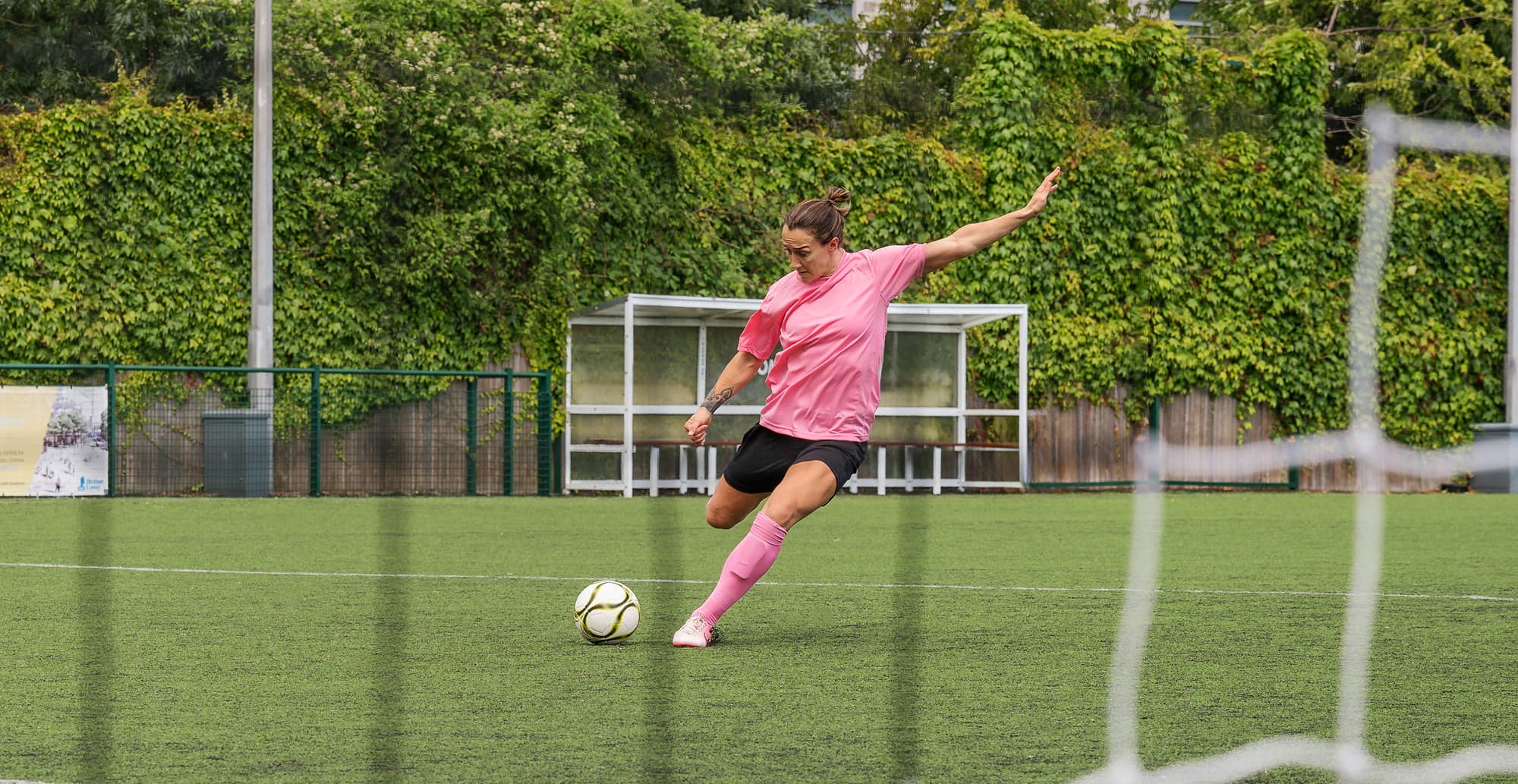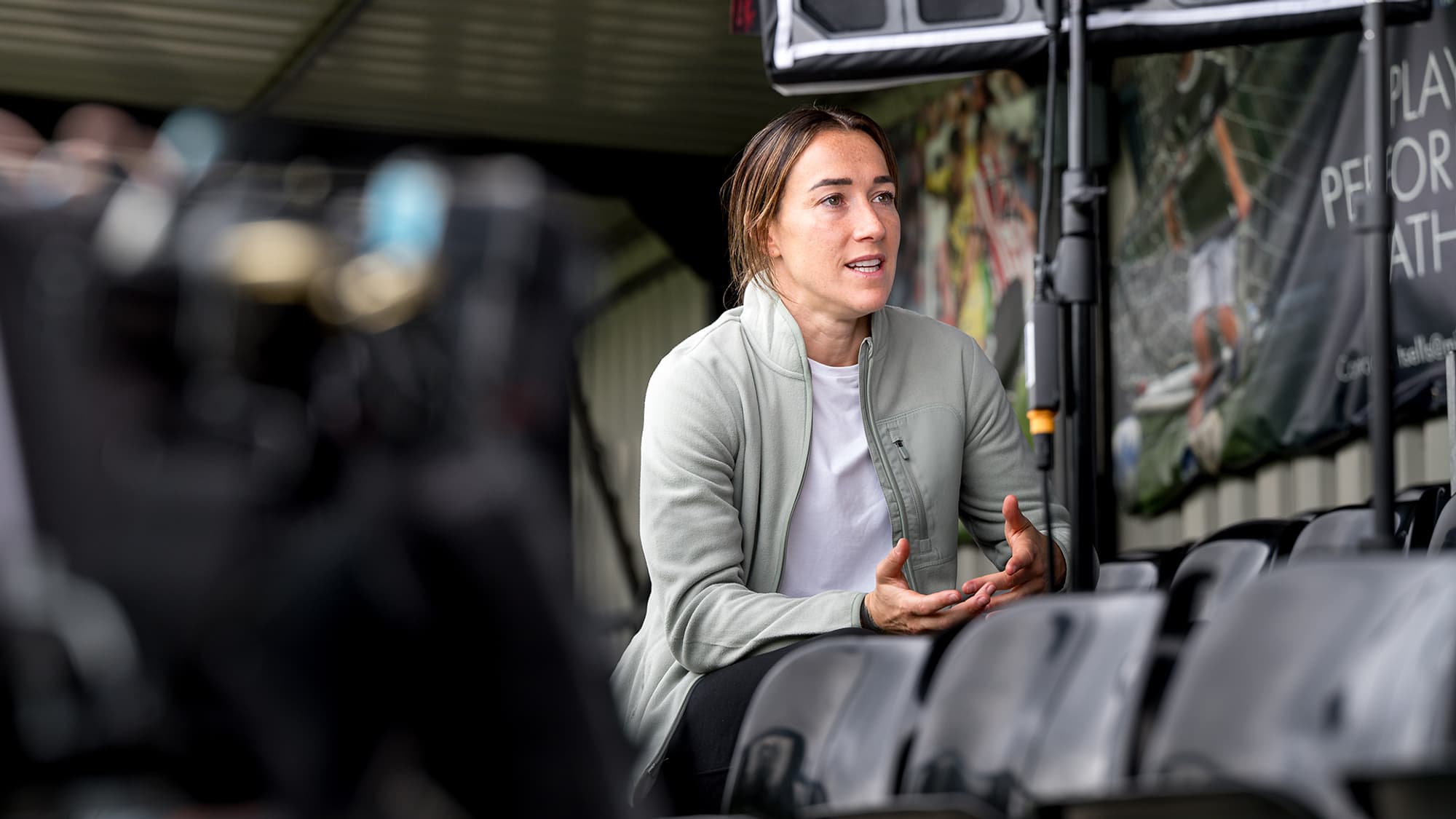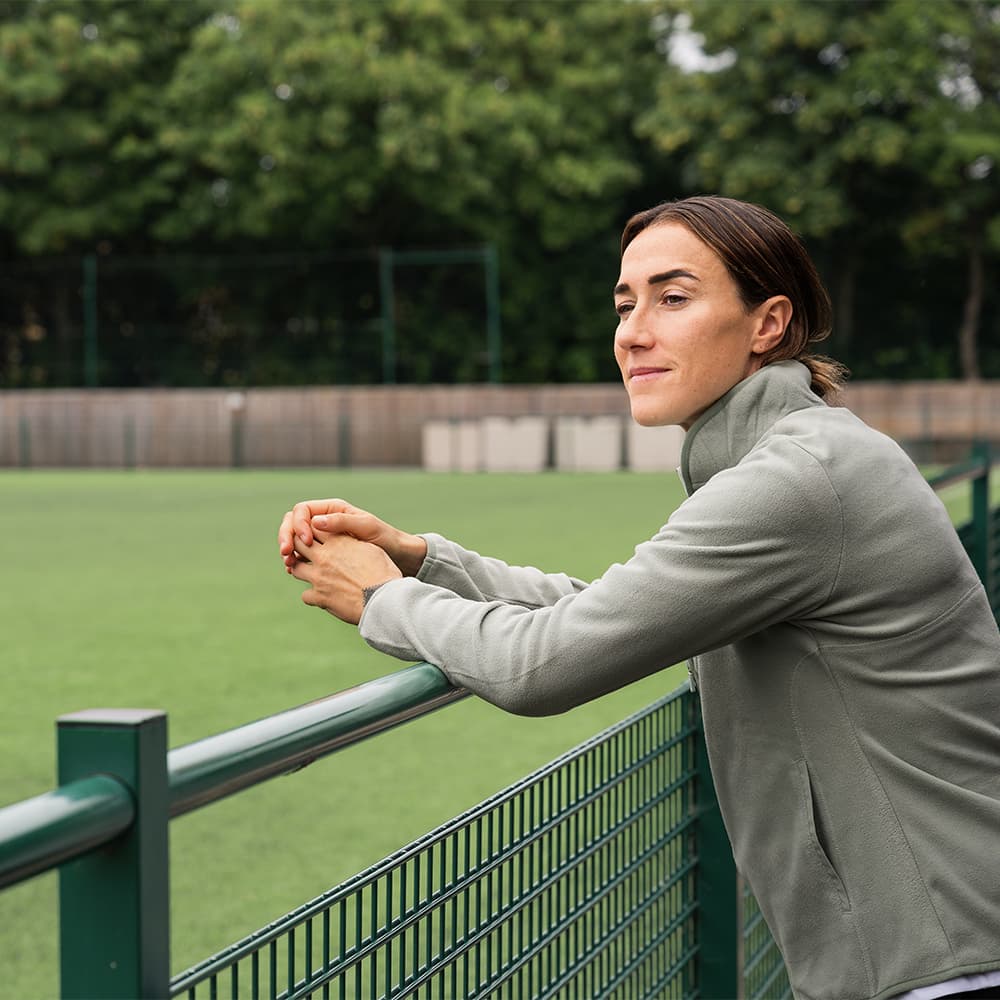Meet professional international footballer Lucy Bronze, MBE
Hi, I’m Lucy Bronze, MBE, winner of the Euros and 5 Champions League titles.
I’ve struggled with the hassles of playing football and living my life with glasses from a young age, and from my teenage years with the hassles of contact lenses. I have now achieved visual freedom with the EVO ICL.
Hi, I’m Lucy Bronze, MBE, winner of the Euros and 5 Champions League titles.
I’ve struggled with the hassles of playing football and living my life with glasses from a young age, and from my teenage years with the hassles of contact lenses. I have now achieved visual freedom with the EVO ICL.

What led me to EVO ICL
I’ve won the Euros and 5 champions leagues, but I always had that worry on the pitch that my contact lenses might fall out, and mid game, it actually happened.
Not to mention the tired, dry eyes, uncomfortable lens fits and daily hassles.
I realised I needed to tackle my vision.
I have often dreamed of getting my vision corrected so I no longer had to bother with glasses or contact lenses. Until I heard about EVO ICL I was not convinced I should take the plunge, as a professional footballer my vision is everything.
I looked at the options to correct my vision long term, and EVO ICL really stood out. The other procedures just didn’t look as good to me.
EVO is designed to be a permanent vision correction solution, so no daily maintenance or periodical replacement is required. One thing that appealed to me is that it’s a reversible lens implant, so if ever necessary, the lenses can be removed by my consultant.
Having that flexibility for the future provided me with the peace of mind I needed to make the decision. EVO is additive; it doesn’t remove any corneal tissue with lasers, so it’s in complete harmony with my natural eye – my eye is still the same, my eye.
Life Changing
Professional Footballer
Off the Pitch
I first discovered that I needed glasses when I was about 9 years old. I was often losing or breaking my glasses while playing football. When I became a teenager, I began wearing contact lenses for when I was playing sport. I had quite a few problems with contact lenses, including tired and dry eyes, as well as uncomfortable lens fits. I couldn’t wait to get home so I could finally take them out and rest my eyes.
My eyesight is everything to me, so I needed to feel the benefit was greater than any potential risk.
I wasn’t nervous about the EVO procedure, I was just excited, it was something that I’d wanted for so so long. The procedure was even better than I expected; it was pain free and super quick for me - it’s simple.
My recovery was unbelievable, I was back playing sports, training and playing football within 2-3 weeks.
Lucy Bronze has EVO ICL lenses and is sponsored by STAAR Surgical.

Questions With Lucy
What do you do for a living?
I am a professional footballer, playing league, European and international games.
How long have you had problems with your vision?
I first discovered that I needed glasses when I was about 9 years old. I was often losing or breaking my glasses while playing football. When I became a teenager I began wearing contact lenses for when I was playing sport, which also had their challenges and hassles.
What’s your biggest pain point about wearing contacts?
I had quite a few problems with contact lenses, as any contact lens wearer will tell you, after a few hours of wear you start to feel irritated with dry eyes, you’re rubbing your eyes, and waiting to get home so you can finally take your lenses out and put your glasses on for a moment. It’s like when you take your shoes off at home and get to put your feet up. That was that feeling of, “I get to take my lenses out finally”. Not to mention the worry that a lens might fall out during a game, which actually happened during a league game.
What about EVO ICL helped make your decision?
Aside from the sharp, clear vision you can get - EVO is designed to be a permanent vision correction solution, so no daily maintenance or periodical replacement is required. One thing that appealed to me is that it’s a reversable lens implant, so if ever necessary, the lenses can be removed by my consultant. Having that flexibility for the future provided me with the peace of mind I needed to make the decision. EVO is additive; it doesn’t remove any corneal tissue with lasers, so it’s in complete harmony with my natural eye – my eye is still the same, my eye.
Sind Sie bereit, visuelle Freiheit mit der EVO zu entdecken? Finden Sie noch heute einen Arzt
Wichtige Sicherheitsinformationen
Die ICL ist für die Korrektur/Reduzierung von Kurzsichtigkeit bei Patienten im Alter von 21 bis 60 Jahren im Bereich von -0,5 D bis -20,0 D mit oder ohne Astigmatismus bis zu 6 D und für die Korrektur/Reduzierung von Weitsichtigkeit bei Patienten im Alter von 21 bis 45 Jahren mit einer Weitsichtigkeit im Bereich von +0. 5 D bis +16,0 D mit oder ohne Astigmatismus bis zu 6 D. Um sicher zu sein, dass Ihr Chirurg eine ICL mit der für Ihr Auge am besten geeigneten Stärke einsetzt, sollten Ihre Kurzsichtigkeit, Weitsichtigkeit und Ihr Astigmatismus mindestens ein Jahr lang stabil sein, bevor Sie sich einer Augenoperation unterziehen. Eine ICL-Operation kann Ihre Sehkraft ohne Brille oder Kontaktlinsen verbessern. Die ICL-Operation macht eine Lesebrille nicht überflüssig, selbst wenn Sie sie vorher nie getragen haben. Die ICL-Operation ist eine Alternative zu anderen refraktiven Eingriffen wie der laserunterstützten In-situ-Keratomileusis (LASIK), der photorefraktiven Keratektomie (PRK), und weiteren Korrekturen mittels Schnitt-Techniken oder anderen Mitteln zur Korrektur Ihrer Sehkraft wie Kontaktlinsen und Brillen. Die Implantation einer ICL ist ein chirurgischer Eingriff und birgt als solcher potenziell ernsthafte Risiken. Die folgenden potenziellen Komplikationen/Nebenwirkungen wurden im Zusammenhang mit refraktiven Eingriffen im Allgemeinen berichtet: zusätzliche Operationen, Kataraktbildung, Verlust des bestkorrigierten Sehvermögens, erhöhter Druck im Inneren des Auges, Verlust von Zellen auf der innersten Oberfläche der Hornhaut, Bindehautreizung, akute Hornhautschwellung, anhaltende Hornhautschwellung, Endophthalmitis (totale Augeninfektion), signifikante Blendung und/oder Lichthöfe um Lichter herum, Hyphaem (Blut im Auge), Hypopyon (Eiter im Auge), Augeninfektion, ICL-Verschiebung, Makulaödem, nicht reaktionsfähige Pupille, Pupillenblockglaukom, schwere Entzündung des Auges, Iritis, Uveitis, Glaskörperverlust und Hornhauttransplantation. Bevor Sie eine ICL-Operation in Erwägung ziehen, sollten Sie eine vollständige Augenuntersuchung durchführen lassen und mit Ihrem Augenarzt über die ICL-Operation sprechen, insbesondere über die möglichen Vorteile, Risiken und Komplikationen. Sie sollten auch über die Zeit sprechen, die für die Heilung nach der Operation benötigt wird.
Ihre Region auswählen
Latin America
Referenzen
1. Patient Survey, STAAR Surgical ICL Data Registry, 2018
2. Sanders D. Vukich JA. Comparison of implantable collamer lens (ICL) and laser-assisted in situ keratomileusis (LASIK) for Low Myopia. Cornea. 2006 Dec; 25(10):1139-46. Patient Survey, STAAR Surgical ICL Data Registry, 2018
3. Naves, J.S. Carracedo, G. Cacho-Babillo, I. Diadenosine Nucleotid Measurements as Dry-Eye Score in Patients After LASIK and ICL Surgery. Presented at American Society of Cataract and Refractive Surgery (ASCRS) 2012.
4. Shoja, MR. Besharati, MR. Dry eye after LASIK for myopia: Incidence and risk factors. European Journal of Ophthalmology. 2007; 17(1): pp. 1-6.
5a. Lee, Jae Bum et al. Comparison of tear secretion and tear film instability after photorefractive keratectomy and laser in situ keratomileusis. Journal of Cataract & Refractive Surgery , Volume 26 , Issue 9 , 1326 - 1331.
5b. Parkhurst, G. Psolka, M. Kezirian, G. Phakic intraocular lens implantantion in United States military warfighters: A retrospective analysis of early clinical outcomes of the Visian ICL. J Refract Surg. 2011;27(7):473-481.


